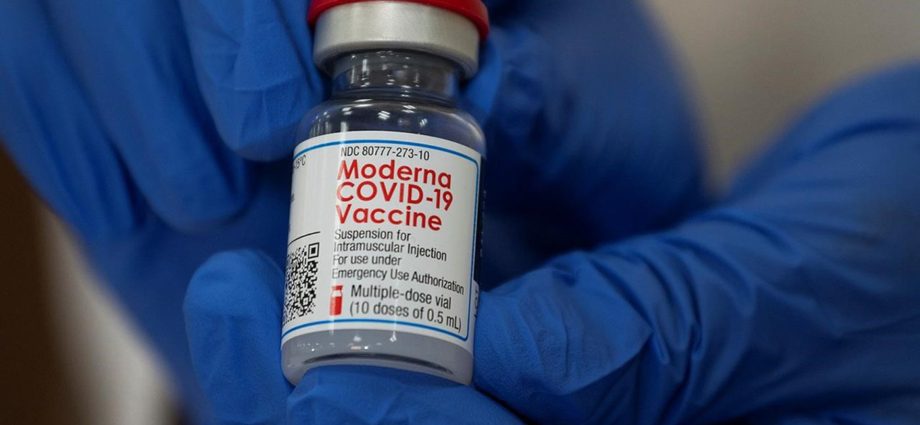Remote B.C. First Nations to begin getting Moderna’s COVID-19 vaccine this week
Michelle Chester, director of employee health services at Northwell Health, holds a bottle containing the Moderna COVID-19 vaccine at Northwell Health’s Long Island Jewish Valley Stream hospital in Valley Stream, N.Y., on Monday, Dec. 21, 2020. (THE CANADIAN PRESS/Eduardo Munoz/Pool via AP)
By Rebecca Dyok, Local Journalism Initiative Reporter, The Williams Lake Tribune
Dec 28, 2020
Several B.C. First Nations are scheduled to receive their first COVID-19 vaccines.
The Moderna vaccine will be offered to everyone aged 18 and over in 10 rural and remote Indigenous communities in B.C. this week, mostly in the north, where health care services are limited.
Although the First Nations Health Authority (FNHA) could not be reached for comment, the Tahltan Central Government (TCG) confirmed they are one of the recipients.
On Christmas Eve, TCG wrote the vaccine would be arriving in all three of their communities, including Iskut (Luwe Chon), Dease Lake, (Talh’ah) and Telegraph Creek (Tlegohin) on Dec. 29.

Unlike the first COVID-19 vaccine by Pfizer-BioNTech, which arrived in B.C. on Dec. 14, the Moderna vaccine is the preferred option for remote communities as it does not require ultra-cold storage and is easier to handle.
Indigenous peoples are at a higher risk of COVID-19 than the rest of the population due to reduced access to stable housing, income, clean water, and or health services, FNHA noted.
As of Dec. 27, Indigenous Services Canada said it was aware of 585 positive confirmed positive COVID-19 cases on First Nations reserves in B.C.
In recent weeks, many First Nations have confirmed potential exposures, including Saik’uz First Nation near Vanderhoof and Stswecem’c Xgat’tem First Nation southwest of Williams Lake, which are both denying access to non-residents.
FNHA said while it recognizes that some Indigenous people lack trust in the medical system, “it is important to note that vaccine trials go through rigorous, well-established ethical processes.”
“Providing vaccines in a timely and effective way to First Nations communities is an important step towards protecting individuals, families and communities,” FNHA said in a joint statement with the First Nations Health Council and First Nations Health Directors Association.
Subscribe to our newsletter.
A COVID-19 variant first identified in the United Kingdom, which is believed to spread more quickly and easily, was confirmed in B.C. on Dec. 27 by provincial health officer Dr. Bonnie Henry and Health Minister Adrian Dix.


